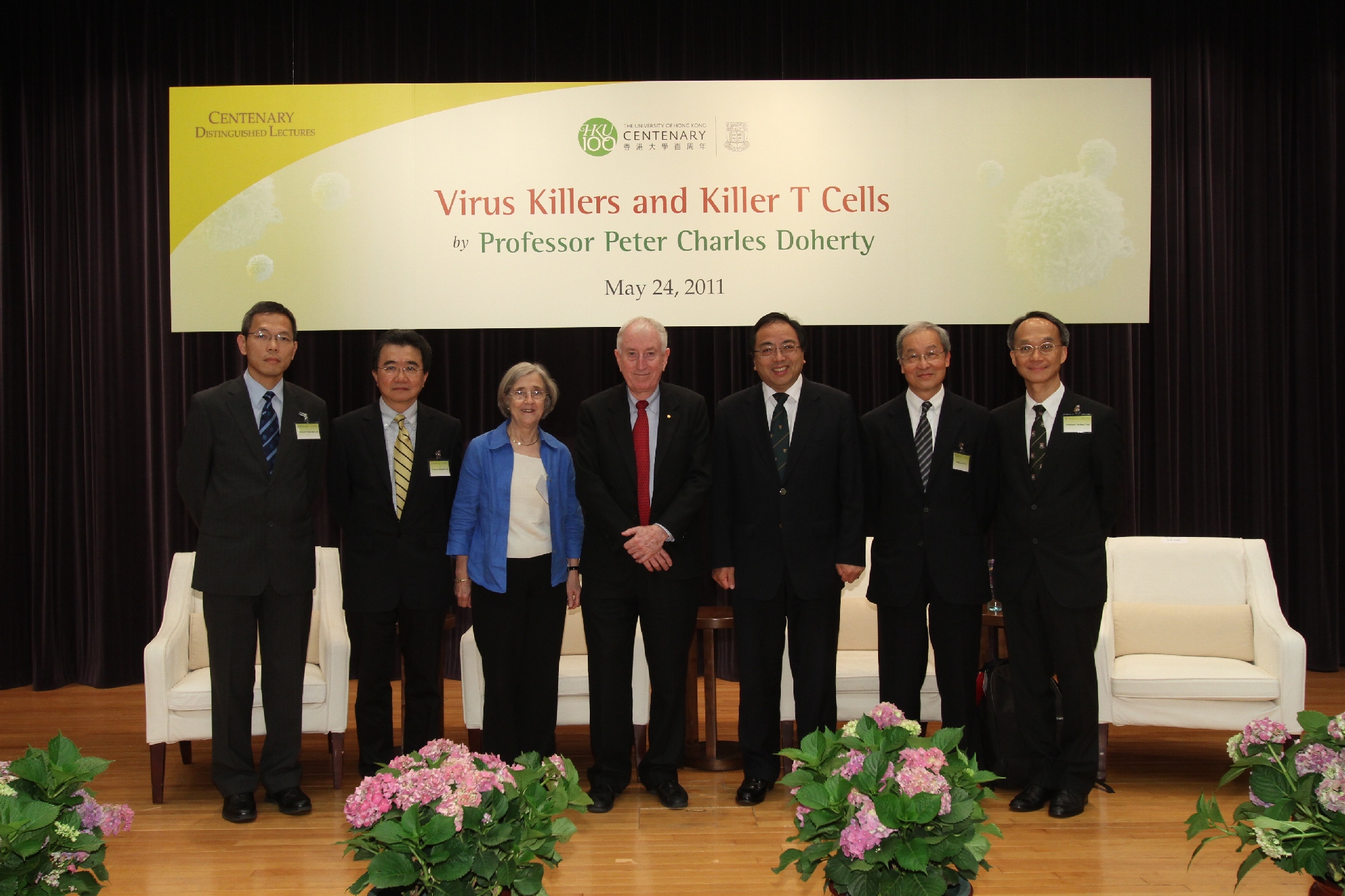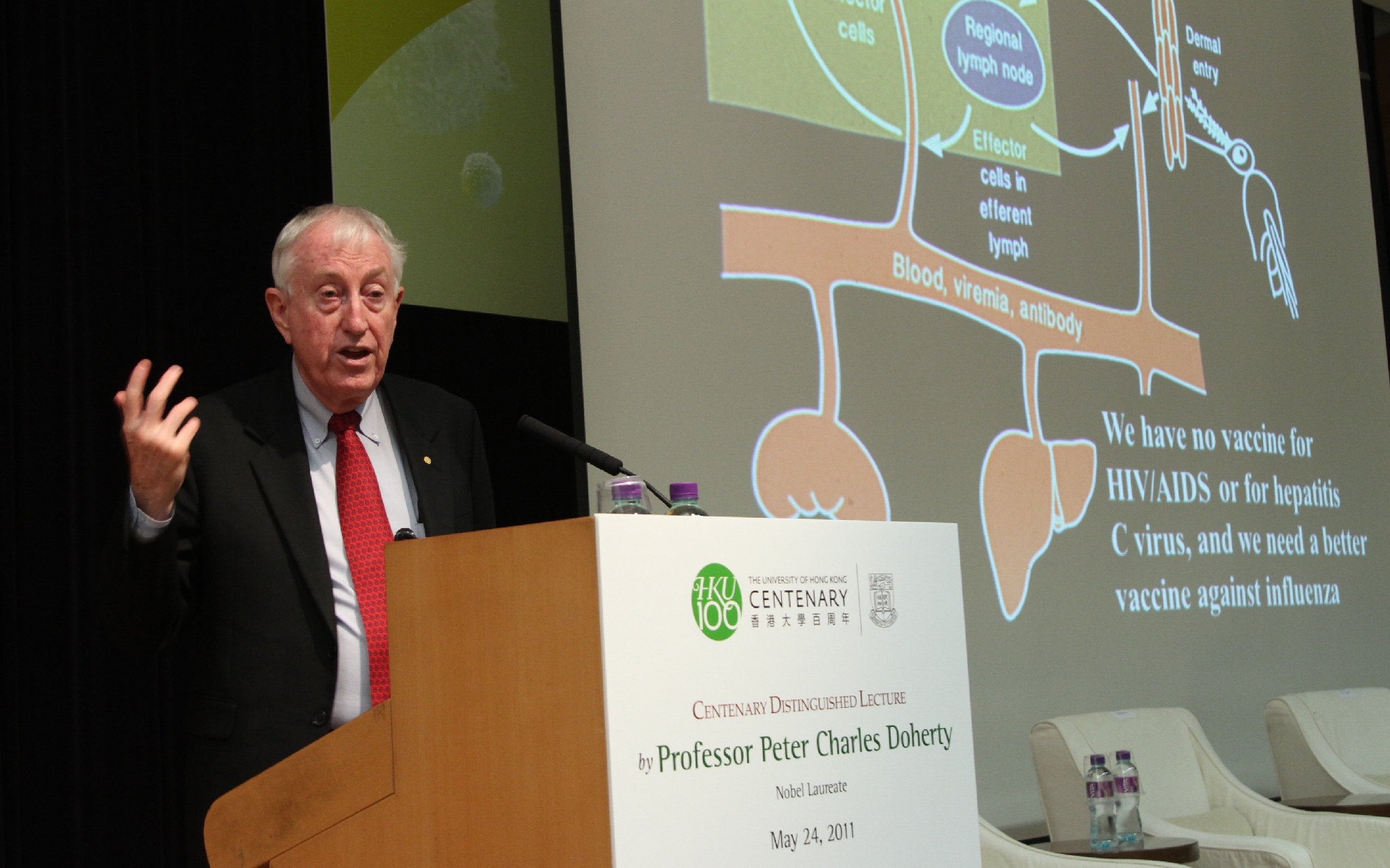Media
Nobel Laureate Professor Peter Charles Doherty gives the 7th HKU Centenary Distinguished Lecture: Virus Killers and Killer T Cells
24 May 2011
On its 100th anniversary, the University of Hong Kong (HKU) proudly presents a series of Centenary Distinguished Lectures, bringing eminent scholars and their world-class scholarship to the University. Professor Peter Charles Doherty, recipient of Nobel Prize in Physiology or Medicine in 1996, gave a Centenary Distinguished Lecture entitled "Virus Killers and Killer T Cells" today (May 24) at HKU. Over 400 audiences were attracted to the lecture.
Professor Peter Charles Doherty is the first person with a veterinary qualification to win a Nobel Prize. Fascinated by the formation of diseases since his adolescence, he resolved to graduate in veterinary science and later pursued a research career in the area of virology. His greatest achievement lies in the discovery of how immune system recognises virus-infected cells. His discovery explains the mechanism of killer T cells identifying and destroying virus-infected cells, while leaving the normal healthy cells unharmed. The groundbreaking discovery not only fundamentally changes the understanding of immunity, but also provides a brand-new direction to the design of vaccines, bringing new hopes to the everlasting combat of human beings against viruses.
In the lecture, Professor Doherty shared his expertise and knowledge on the mechanism, history and achievements of human beings fighting against viruses, and also his insights in the future development of anti-viral vaccines in an immunology perspective. Professor Doherty said since Hong Kong is an international city which attracts people from mainland China and different countries to come, viruses may mix and spread here. With some wonderful scientists and the good records of the hospitals and schools to trace from, Professor Doherty thought Hong Kong is one of the best places in the world to study influenza.
As the lecture attracted many young students who wish to pursue scientific research in the future, Professor Doherty reminded them Science is fun but hard. He said scientists keep trying to do something new, they may fail for many times. Hence they should find a target, set a goal and keep themselves motivated. He also advised that talking to people is very important in science, since interaction helps scientists to gain expertise from brilliant minds of other disciplines.
The lecture was followed by a panel discussion featuring Professor Roland T. Chin, Deputy Vice-Chancellor of HKU and Professor Lau Chak-sing, Chair Professor and Chief of Rheumatology and Clinical Immunology, Department of Medicine, HKU Li Ka Shing Faculty of Medicine, with Professor Lau Yu-lung, Doris Zimmern Professor in Community Child Health, Chair Professor and Head of Department of Paediatrics & Adolescent Medicine, HKU Li Ka Shing Faculty of Medicine being the moderator.
On Wednesday (May 25), 25 senior secondary school students and medical undergraduates will exchange views with Professor Doherty in an activity called ‘Lunch with a Laureate', which has been set up as an extension of the Centenary Distinguished Lecture. The event aims to foster Knowledge Exchange between university and secondary schools, and help students broaden their horizons by meeting face-to-face with some of the most brilliant minds in the world today.
For event photos, please visit http://www.med.hku.hk/v1/news-and-events/press-releases/
Appendix: Lecture Abstract
Virus Killers and Killer T Cells
Mammals like us are large, complex, slow-reproducing life forms that are subject to parasitism by simpler, rapidly dividing (and mutating) organisms. Through evolutionary time, this need to counter infection has led to the evolution of innate immune mechanisms that are common to many species, and to the extraordinarily specific, adaptive immune system that is characteristic of higher vertebrates.
Replicating only in living cells, the viruses are obligate intracellular parasites that throw up two types of challenges for immune control. In free form, the viruses must in some way transit via the air, through protective mucus layers (or in the blood) to access, then enter, the body cells that will support their growth. At that stage, they are vulnerable to attack by secreted antibodies that bind, in the main, to conformed (tertiary) structures on surface glycoproteins. Antibody immunity is the basis of all successful vaccines to date. Then, if a virus has succeeded in bypassing antibody control, there's the need to eliminate the infected cells that serve as "factories" to produce new virus particles and propagate the disease process. That's the role of the CD8+ or "killer" T cells (T Cells), that are targeted to modified (by virus peptide) transplantation or major histocompatibility complex (MHC) molecules on the surface of infected cells.
With potentially lethal pathogens, it is this interplay between the kinetics of virus spread on the one hand, and immunity on the other, that determines the fate of the infected individual.

(From left) Professor Lau Chak-sing, Chair Professor and Chief of Rheumatology and Clinical Immunology, Department of Medicine, HKU Li Ka Shing Faculty of Medicine; Professor Roland T. Chin, Deputy Vice-Chancellor of HKU; Mrs Doherty; Professor Peter Charles Doherty, Recipient of Nobel Prize in Physiology or Medicine in 1996; Professor Tsui Lap-chee, Vice-Chancellor of HKU; Professor Lee Sum-ping, Dexter HC Man Family Professor in Medical Science, Dean of HKU Li Ka Shing Faculty of Medicine; Professor Lau Yu-lung, Doris Zimmern Professor in Community Child Health, Chair Professor and Head of Department of Paediatrics & Adolescent Medicine, HKU Li Ka Shing Faculty of Medicine.

Professor Peter Charles Doherty, Recipient of Nobel Prize in Physiology or Medicine in 1996 says that Hong Kong is a good place to study influenza, as it has brilliant scientists and good records of the hospitals and schools to trace from.
